Data from independent research, Effective Management of Safe & Secure Openings & Identities, released from Ingersoll Rand Security Technologies shows 82% of public, private and 2-year specialized colleges and universities believe they are not very effective at managing safe and secure openings or identities. Only 18% believe they are very effective at granting or denying access to appropriate individuals or knowing who goes where.
“We found there are very differing mentalities on how access control systems are designed and managed,” reports Beverly Vigue, vice president of education markets at Ingersoll Rand Security Technologies. “Facilities and Public Safety, the key stakeholders in 57% of colleges, are more traditional in their approach while IT, One Card and Housing departments are more customer-/student-oriented. The focus is evolving from the former to the latter.”
According to Vigue, if the IT, One Card or Housing departments are the key stakeholders, the solutions are more innovative. For instance, the One Card department considers convenience, customer service, improving customer experiences and including the students’ perceptions in the access control decision as primary concerns. IT’s major focus is measuring the return on investment to the higher education institution to improve options for upgrading.
In general, access control on campus is evolving from the traditional security/product-oriented focus of the Facilities and Public Safety departments to the broader definition of the IT, One Card and Housing departments. Differing mentalities typically do not occur on the same campus as colleges tend to be solely one or the other in their focus.
Respective of the way access control is viewed, the five leading concerns on college campuses are:
- Minimizing the occurrence of tailgating/piggy-backing
- Maximizing the likelihood the students can comply with the intended access design
- Maximizing real-time notification when problems occur
- Minimizing the time it takes to lockdown a campus.
- Maximizing the ability to locate building occupants in an emergency
The study was conducted among more than 140 colleges and universities, including leading institutions such as the University of Michigan, MIT, UCLA and Columbia. BD+C
Related Stories
Products and Materials | Oct 17, 2024
5 multifamily tech products for your next project
Multifamily housing and technological upgrades go hand-in-hand. From the rise in electric vehicle charging needs to the sophistication of smart home accessories, tech products are abound in the multifamily space.
Smart Buildings | Jul 1, 2024
GSA to invest $80 million on smart building technologies at federal properties
The U.S. General Services Administration (GSA) will invest $80 million from the Inflation Reduction Act (IRA) into smart building technologies within 560 federal buildings. GSA intends to enhance operations through granular controls, expand available reporting with more advanced metering sources, and optimize the operator experience.
K-12 Schools | Jan 25, 2023
As gun incidents grow, schools have beefed up security significantly in recent years
Recently released federal data shows that U.S. schools have significantly raised security measures in recent years. About two-thirds of public schools now control access to school grounds—not just the building—up from about half in the 2017-18 school year.
BAS and Security | Oct 19, 2022
The biggest cybersecurity threats in commercial real estate, and how to mitigate them
Coleman Wolf, Senior Security Systems Consultant with global engineering firm ESD, outlines the top-three cybersecurity threats to commercial and institutional building owners and property managers, and offers advice on how to deter and defend against hackers.
Security and Life Safety | Jul 5, 2022
What AEC firms should look for in a cybersecurity partner
When looking for expert partners in cybersecurity, AEC firms will find quite a lot of companies claiming to be at the forefront of modern threats. Here are five key points to look for when choosing a cybersecurity firm.
Smart Buildings | Jun 1, 2022
Taking full advantage of smart building technology
Drew Deatherage of Crux Solutions discusses where owners and AEC firms could do better at optimizing smart technology in building design and operations.
BAS and Security | May 26, 2022
Can your intelligent building outsmart hackers?
ESD's security services studio leader Coleman Wolf offers tips, advice, and lessons for protecting real estate assets from cyberattacks.
75 Top Building Products | Dec 16, 2019
101 Top Products for 2019
Building Design+Construction readers and editors select their top building products for the past 12 months in the fourth-annual 101 Top Products report.
Seismic Design | Jun 9, 2015
First building-specific earthquake warning system installed in North Portland, Ore.
The ShakeAlarm system recognizes and quantifies the faster but lower-energy seismic P-wave, which is the precursor to the more damaging S-wave.
Fire and Life Safety | May 27, 2015
7 bold applications and innovations for fire and life safety
BD+C’s roundup features colorful sprinklers for offices, hotels, museums; a fire-rated curtain wall at a transit hub in Manhattan; a combination CO/smoke detector; and more.

















